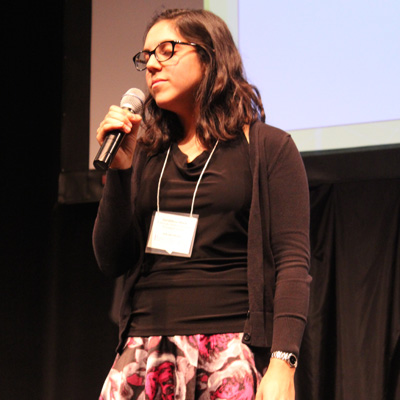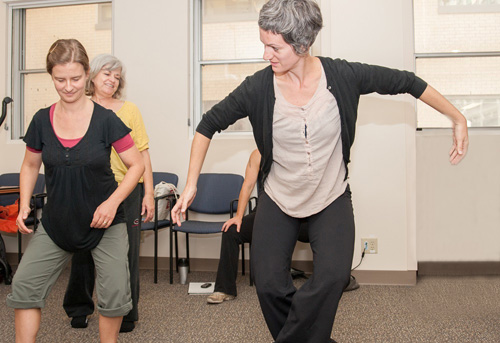
SarahRose Black, singing to an audience of healthcare practitioners and artists at the inaugural Art Heals Health | Health Heals Art, to demonstrate her therapy work in palliative care. (Photo: UHN)
No one has to convince SarahRose Black of the healing power of art.
As a music therapist who works with cancer patients, SarahRose has many stories to tell. Once, a sick mother wrote a letter to her daughters that she wanted expressed in song. Together, SarahRose and the woman created the song and recorded it for her family and friends.
"Music therapy can be a powerful catalyst in providing opportunities for self-expression both with and without words, and can be a springboard to begin conversations around challenging topics and feelings that arise during the course of illness," explains SarahRose, who specializes in psychosocial oncology and palliative care at the Princess Margaret Cancer Centre.
SarahRose was one of the presenters at the first-ever Art Heals Health | Health Heals Art (AHH I HHA) symposium, organized by UHN's OpenLab in collaboration with Toronto Western's Artists' Health Centre and the Artists' Health Alliance. The symposium was the kick-off to a three-year strategy to develop the arts in health care.
At the inaugural event, SarahRose performed the mother's song to an auditorium filled with individuals from the healthcare and arts industries.
Arts and healthcare join forces
"There is a large community of people who are impassioned by the arts and are integrating the arts in healing practices," explains Bryan Croft, coordinator at the Al and Malka Green Artists' Health Centre at Toronto Western.
"Until now, there has been little opportunity for this community of artists, practitioners and researchers to share the work that we do."
On how the idea for the AHH | HHA symposium came to life, OpenLab's Director Dr. Howard Abrams explains, "We thought that it would be interesting to bring together artists, patients, practitioners, and policy makers to create a community, share practice, and raise the profile of the Arts and Health."
"It makes perfect sense to bring the expertise of the artist in a discussion about the healing journey of a patient to help them face the physical and emotional challenges encountered," explains Bryan.
De-stigmatizing disease through playwriting
Julia's chosen art to contribute to healthcare is playwriting.
A trained playwright and theatre director, her work in the field of art and healthcare includes collaborating with UHN's Toronto Rehab, where she used plays to translate research findings about client-centred care to an audience of healthcare professionals.
One of Julia's current projects called, "Cracked: new light on dementia" is based in part on research from UHN, and is produced by Partnerships in Dementia Care Alliance.

Julia Gray (R) uses playwriting to increase understanding of illness and to explore associated stigmas. Here she rehearses for "Cracked" with actors Claire Frances Muir (L) and Susan Applewhaite. (Photo: Dahlia Katz)
"We were interested in creating 'Cracked' to open up a space for people to re-think how we've come to understand dementia as only filled with loss. We hope to offer a new way to think of people with dementia as filled with hope and possibility," explains Julia.
"Each of my projects has in some way looked at deep-seated assumptions, and even more specifically explored stigma."
"A stronger healthcare system"
"AHH I HHA seeks to include of all types of artistic endeavours and recognizes that there are many permutations of how the arts and health care integrate," explains Kendra Delicaet, Managing Director of OpenLab at UHN.
SarahRose integrates music with palliative care, while Julia integrates playwriting with understanding illness.
SarahRose uses her chosen medium – music - to help patients with pain and symptom management, emotional support and creation of meaning and self-awareness.
"I am a firm believer that the arts and healthcare need to be more integrated into each other, and that this will serve to better both fields in service of a stronger healthcare system and more inspired arts community," says SarahRose.
